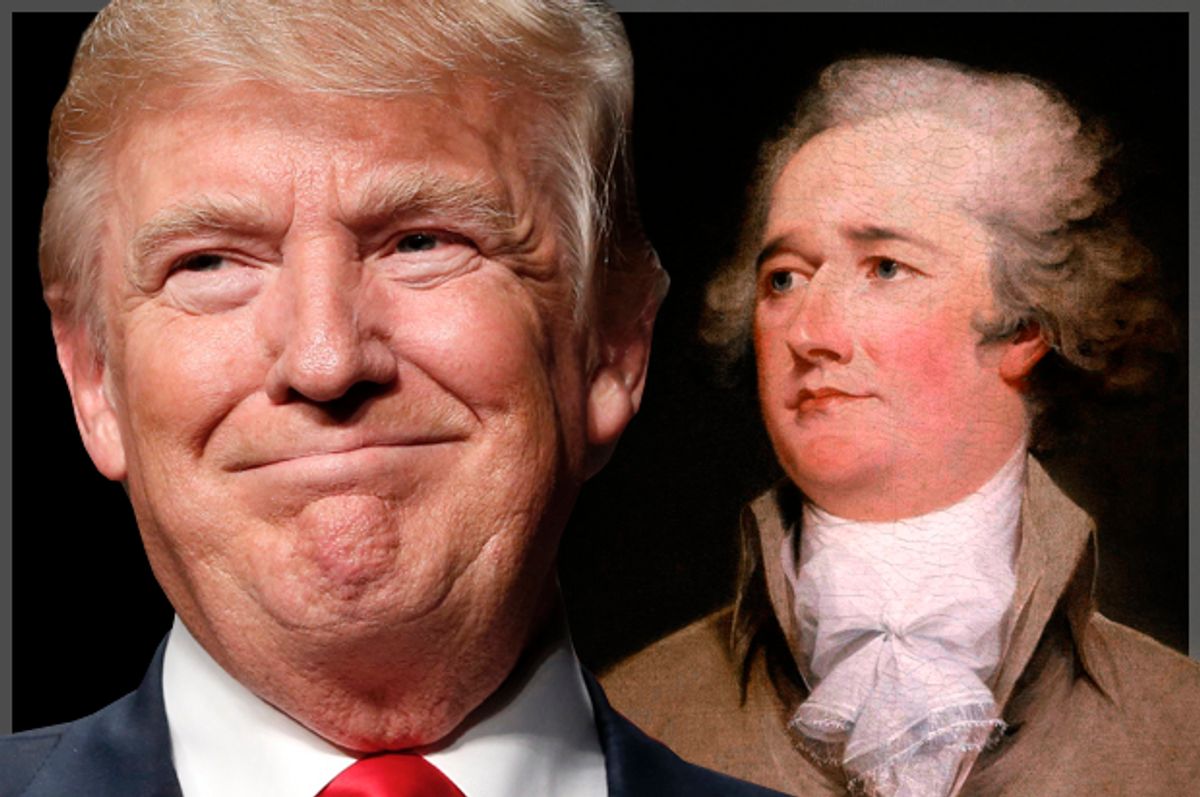Soon, we can add the Electoral College to the long list of American institutions whose failure this election season will result in a butternut squash-colored bigot occupying the Oval Office in January.
Trump fans will argue with this assessment because a) it denies their candidate’s legitimacy as the winner of the Nov. 8 election and b) because in terms of its mechanics, the Electoral College is working just fine. Also c) shut up, libtard! Pending the call for recounts in three states, Trump won the popular vote in enough states to earn the minimum of 270 electors that give him the presidency. It does not matter that he lost the national popular vote by, as of now, more than 2 million ballots. By all the rules of the Electoral College game, the real estate mogul won the presidency fair and square.
But the issue here is not the mechanics of the Electoral College. The issue is its anti-democratic nature and its longtime function as nothing more than a rubber stamp to validate its winner. So when faced with a crisis of legitimacy, institutional torpor and habit prevent it from rising to the occasion. And on Dec. 19 the Electoral College will meekly allow itself to be steamrollered.
The Electoral College is the result of a compromise made when the Constitution was being drafted by the Founding Fathers. Some of the founders, chief among them James Madison, wanted presidents to be chosen by popular vote. Others, chiefly Alexander Hamilton, had two concerns: The first involved people from Southern states who preferred the Electoral College because the number of electors per state is decided based on the number of the state’s congressional representatives. With each nonvoting slave counted as three-fifths of a person for apportionment of those representatives (and thus Electoral College votes), the South could maintain its power in the national legislature.
The second concern, of Hamilton and others, was that the people would one day fall for a populist, unqualified demagogue and vote him into office. The electors, therefore, would be a check on raw democracy, a buffer between the rabble and the “learned” and independent electors who would have a clearer sense of the country’s interests.
In practice, however, the Electoral College has never worked like that. In all but four of our presidential elections, including this one, the winner of the popular vote winner has also won the Electoral College. The electors who gather just before Christmas in their respective state capitals to cast their votes have always ratified the decision of the votes in their state not challenged it.
So over the centuries the Electoral College has devolved. It is now yet one more example of the highly polarized partisanship of the rest of our democracy. Rather than a repository of learned people acting in the best interests of the country, the electors chosen to represent states in the Electoral College are a collection of loyal party hacks, activists and elected officials. If the selection of electors is a formality, why would state parties choose rabble-rousers?
This leads to some fairly notable conflicts of interest and questions about the qualifications for this year’s electors. For example, should a candidate’s husband or son be expected to change their electoral vote for the good of the country if, say, evidence of impeachment-level corruption arises before Dec. 19? Should a crackpot conspiracy theorist?
What about Pam Bondi, Florida’s attorney general. Bondi is both an elector and a member of Trump’s transition team. But more than that, her history with Trump came under scrutiny during the campaign when it was revealed that she solicited in 2013 a $25,000 campaign donation from him, which he illegally paid out of funds from his charitable foundation. Four days after Trump cut that check, Bondi announced her office would not pursue fraud charges against the real estate mogul over his Trump University scam.
Both Bondi and Trump have denied that this exchange was any sort of pay-for-play arrangement, and that the timing of her solicitation and decision to not pursue the fraud case were entirely coincidental. And perhaps they were! But given the national profile that Bondi has earned by grafting herself onto Trump’s campaign (she was also a featured speaker at this summer’s Republican National Convention), is there any reason to think she will change her mind about her Electoral College vote no matter what slimy corruption oozes out of Trump Tower in the next four weeks?
The answer is found in the combination of partisan polarization and institutional inertia that has taken hold of the Electoral College, as it has taken hold of so many other institutions. It is why the quixotic movement to convince Republican electors to throw their votes to Hillary Clinton is the longest of long shots — longer even than hopes that the recount movement championed by Green Party candidate Jill Stein will change the outcome of the election. It is why on Dec. 19, this supposed buffer protecting all citizens against demagogues and con men is going to install Cheeto Henry Gondorff in the White House.
The Electoral College needs either major reform or it should be abolished — assuming there is a country left after Trump and his cronies finish looting it.



Shares